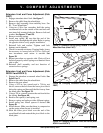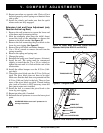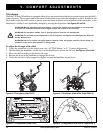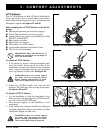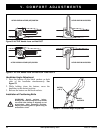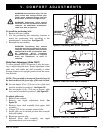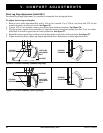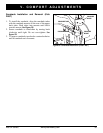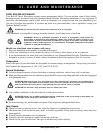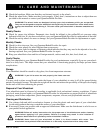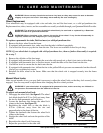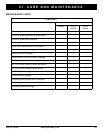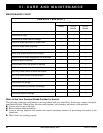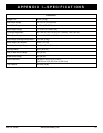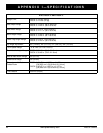
36 www.pridemobility.com Kids UP Series
CARE AND MAINTENANCE
Your Kids UP Series Wheelchair requires routine maintenance checks. You can perform some of these checks,
but others require assistance from your Quantum Rehab Provider. Preventive maintenance is very important. If
you follow the maintenance checks in this section as scheduled, you can help ensure that your wheelchair gives
you years of trouble-free operation. If you have any doubt as to your wheelchair’s care or operation, contact your
Quantum Rehab Provider.
WARNING! Do not service the wheelchair when the seat is occupied.
Your wheelchair is susceptible to damage from the elements. Avoid damp areas of any kind.
WARNING! Direct or prolonged exposure to water or dampness could cause the
wheelchair to malfunction mechanically. Water can cause the chair’s frame to rust.
Wheelchairs should be examined periodically for signs of corrosion caused by water
exposure, bodily fluids exposure, or incontinence. Damaged components should be
replaced or treated immediately.
Should your wheelchair come in contact with water:
1. Dry your wheelchair as thoroughly as possible with a towel.
2. Allow your wheelchair to sit in a warm, dry place for 12 hours to allow unseen water to evaporate.
3. If any inconsistencies are found, take your wheelchair to your Quantum Rehab Provider. Wheelchairs that are
frequently exposed to sources of water, such as incontinence, should be inspected often for corrosion.
Temperature
Some of the parts of your wheelchair are susceptible to extreme changes in temperature. Always keep your wheel-
chair between the temperatures of 18°F (-8°C) and 122°F (50°C).
General Guidelines
Avoid prolonged exposure of your wheelchair to extreme conditions, such as heat, cold, or moisture.
Make sure the pneumatic tires are inflated to the psi/bar/kPa air pressure rating indicated on the tire if equipped
with pneumatic tires.
WARNING! Make sure your tires are inflated to the psi/bar/kPa air pressure rating indicated on
the tire. Do not underinflate or overinflate your tires. Low pressure may result in loss of control,
and overinflated tires may burst. Overinflating tires can cause them to explode.
WARNING! Do not use a high pressure hose to inflate your tires.
Use a rubber conditioner on the tire sidewalls to help preserve them.
WARNING! Never use a rubber conditioner on the tread area of the tires; doing so may make the
tires slippery and cause your wheelchair to skid.
All wheel bearings are prelubricated and sealed. They require no subsequent lubrication.
Daily Checks
Check for loose or missing screws, nuts, and bolts. Replace or tighten them as necessary.
Check the tires. Look for uneven wear, holes, or tire/rim separation. If they look excessively worn, then have
them replaced.
Visually inspect pneumatic tires for punctures.
Confirm correct air pressure as marked on the side of the tire.
Check for flat spots on solid tires. Flat spots could adversely affect stability.
VI. CARE AND MAINTENANCE



